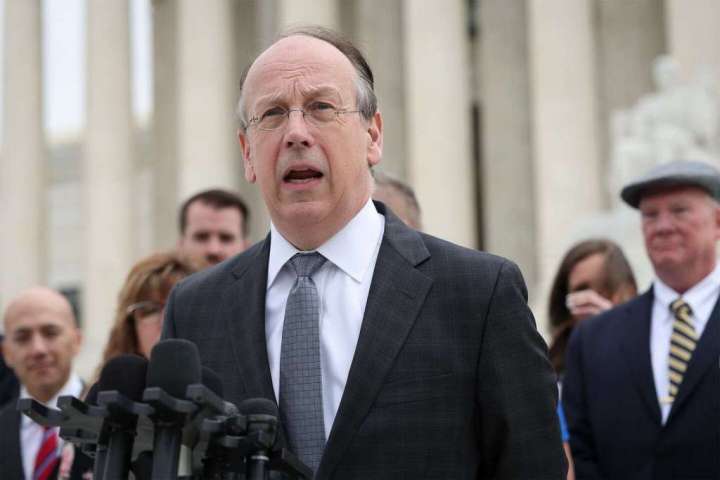Unquestionably, the end of the Supreme Court’s most recent term was one of the most epic in its history: the Dobbs ruling overturning Roe v. Wade, the decision striking down a New York gun-control law, and one holding that Maine’s private-school voucher program could not exclude religious schools.
A firm’s split with its star gun-case lawyer shows what ails the left

Taken together, the rulings represent a confident and muscular conservative jurisprudence, and a direct challenge to a legal consensus carefully constructed over decades by generations of left-leaning academics and judges. Cue rage mixed with despair on the left, and exultation on the right. Cue also a whole lot of shouting.
Amid the hubbub, it was easy to miss another important Supreme Court drama. The winning side of that New York gun-control case was argued by noted appellate attorney Paul D. Clement. Yet instead of offering congratulations for a job well done, Clement’s firm, the venerable Kirkland & Ellis, abruptly announced that it would no longer accept Second Amendment cases. Clement and another Kirkland & Ellis partner, Erin Murphy, have left to start their own firm.
This contretemps might not matter much in itself; Murphy and Clement will undoubtedly be fine. Nonetheless, it neatly encapsulates the polarizing forces ripping the country apart and endangering the legitimacy of the Supreme Court.
Follow Megan McArdle‘s opinions
FollowLawyers used to have a standard response to people who complained about their choice of clients: Everyone, no matter how noxious, deserves representation. A Washington law firm might find itself representing Richard M. Nixon and Ted Kennedy at the same time; the American Civil Liberties Union could end up defending the right of Nazis to march through a Jewish neighborhood in Skokie, Ill.
So it’s troubling to see a major firm not just ruling out a whole category of cases but also forcing its attorneys to choose between representing their current clients or keeping their jobs.
This is not the first time this has happened to Clement, who in 2011 was forced out of King & Spalding over his advocacy of the Defense of Marriage Act. But this trend marks a striking departure from the profession’s old norms. And it’s hard not to see this as a symptom of the cancel culture that has overtaken a number of American institutions, including the elite law schools where Kirkland & Ellis recruits.
The firm itself might have no objections to conservative causes — this is, after all, Justice Brett M. Kavanaugh’s former employer. But like many American institutions, it is under pressure from a younger generation of workers who are much further to the left, and much less tolerant of dissent, than their predecessors. It is also under pressure from corporate clients that are — partly in deference to their own youngsters — increasingly comfortable using their power to advance the left’s side of controversial social issues.
This is obviously bad for conservative lawyers, and for a society that aspires to liberal values. But it’s not great for the left, as it essentially doubles down on a strategy that has already failed: using the left’s control over key institutions to essentially rule some ideas, or policies, out of bounds.
The Supreme Court itself was one of the earliest and most successful examples of this, with liberal majorities discovering sweeping new rights in the Constitution that tied legislators’ hands on a number of contentious questions. Among those, of course, was the right to abortion.
This worked almost too well, frustrating conservatives so completely that they began setting up parallel institutions as counterweights to the left’s increasing dominance of mainstream ones. Academics started conservative think tanks, media moguls created Fox News and its brethren, and lawyers embarked on a long campaign to support conservative legal scholars and scholarship that could remake the courts.
Those efforts got a big boost when Republicans developed their own structural advantage — in the Senate, the House and the electoral college. That, plus some aggressive procedural gamesmanship, gave conservatives control of the Supreme Court.
The left still hasn’t adapted to this new reality. Instead, it is trying to recover lost dominance by hitting the “banish wrongthink” button again, harder.
After the flurry of rulings, academic Twitter and newspaper op-ed pages filled with outraged declarations that the Supreme Court had lost its legitimacy by becoming a partisan, ideological actor. Yet this is precisely how the right feels about media and academia, and increasingly about corporate America. It’s hard to argue the conservatives are wrong while you’re enthusiastically purging them from your ranks.
The more the left tightens its control where it has influence, the more it cedes the institutions it doesn’t control to the other side. Given that those institutions include the Supreme Court, now would be a good time to reflect on the limits of this kind of maneuver.
It would be a good time for the right to reflect on this as well.
No victory is forever, and a conservative court that aspires to true greatness would be thinking about building the future as well as rectifying the past. However justified the conservatives are in reversing the mistakes of their predecessors, they would be wiser still not to repeat them.






